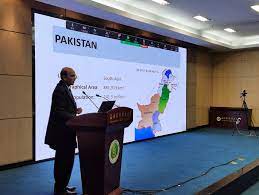Silk Road Wheat Alliance symposium bolsters Pak-China wheat cooperation

Beijing: The 2023 International Symposium of Silk Road Wheat Innovation Alliance was held at Northwest A&F University in Yangling, China. The conference holds significant importance in deepening the cooperation between China and Pakistan in the wheat industry.
More than 160 scholars, researchers and entrepreneurs from 6 countries, including China, Pakistan and Turkey, participated in the symposium, engaging in academic exchanges on key issues such as innovations in wheat germplasm resources, genetic breeding research, agricultural digitalization and mechanization, crop management in climate change
and trend of international wheat trade. Multiple Pakistani experts shared their research findings on the event. Professor Zahid Akram from Pir Mehr Ali Shah Arid Agriculture University Rawalpinid, Pakistan, who is also the vice chairman of the first council of Silk Road Wheat Innovation Alliance, delivered a speech titled Status of Wheat in Pakistan. “Approximately 80% of farmers in Pakistan are involved in wheat production, occupying nearly 40% of the country’s agricultural land.
The significance of wheat production in Pakistan cannot be overstated.” He also expressed optimism about the prospects of collaboration with member countries of the Silk Road Wheat Innovation Alliance. Karim Bux Laghari, a researcher from the Wheat Research Institute in Sindh Province, Pakistan, made an academic report titled Innovative Solutions for Future Food Security: A Collaborative Approach to Wheat Productivity Challenges.
He highlighted various reasons for limited wheat production in Pakistan, including low yield potential of seed varieties, mismanagement, high temperatures, drought, and severe rust damage. The diligent efforts of Chinese wheat experts working in Pakistan have received high praise from Pakistani experts. Chinese hybrid wheat demonstration fields, covering an expansive area of approximately 3,000-5,000 hectares, have demonstrated exceptional performance in crucial wheat-producing regions throughout Pakistan. China’s recent achievements in hybrid wheat breeding, including the cultivation of saline-tolerant wheat varieties, have also laid a solid foundation for enhanced collaboration between China and Pakistan in the wheat industry.
After the symposium, the participants visited the affiliated units of the alliance, such as Shaanxi Jinshahe Group, a well-know noodle manufacturer and Yangling Smart Agriculture Park. Professor Zahid Akram highly appreciated the achievements in automated processing, comprehensive and efficient management of Jinshahe Group, and the smart agriculture practices in Yangling. He expressed the hope that the alliance’s advantages would be leveraged to strengthen the integration of industry, academia, and research, promoting the development of the wheat industry.





